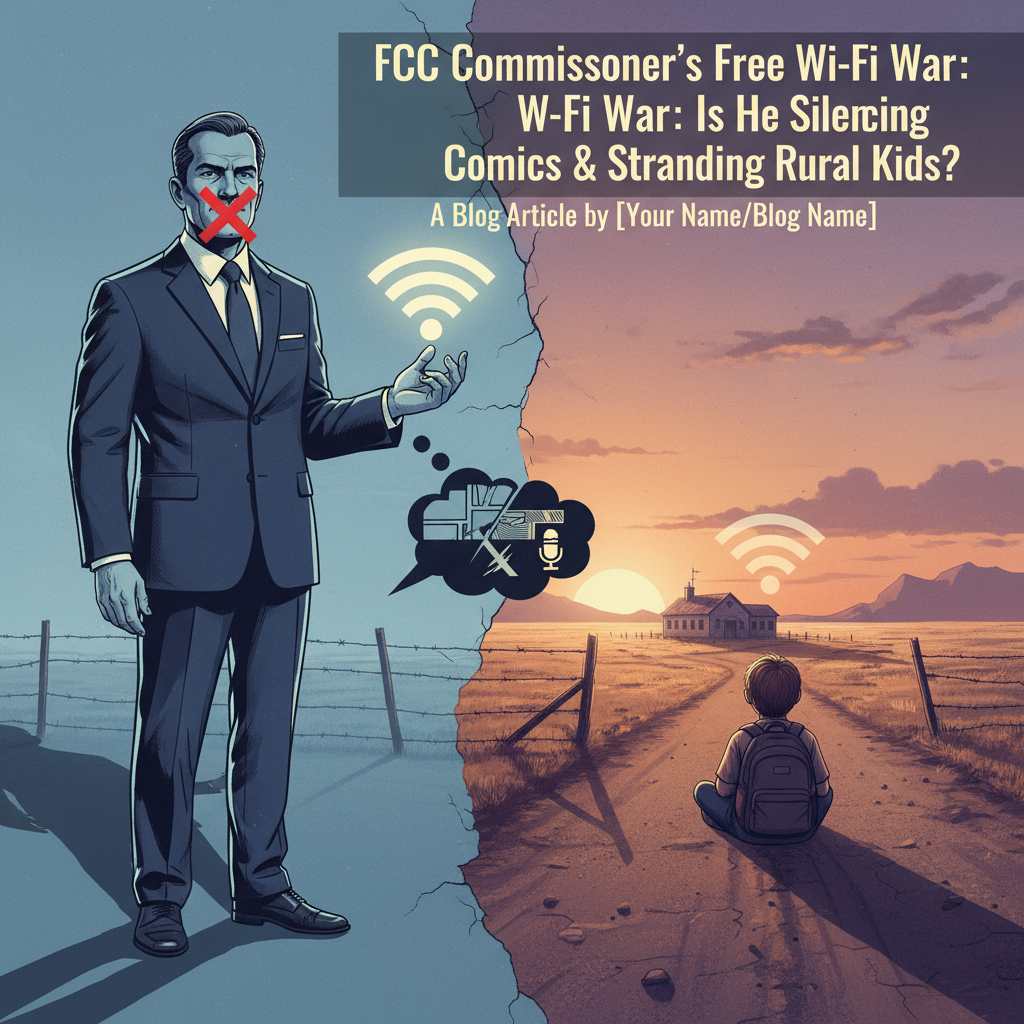When the FCC Commissioner’s Priorities Spark Concern: The Case of Brendan Carr
In a world increasingly reliant on digital connectivity, the internet isn’t just a convenience; it’s a fundamental tool for education, economic opportunity, and civic engagement. Yet, when powerful figures seem to prioritize ideological battles over tangible benefits for vulnerable communities, it raises serious questions about the future of equitable access. Enter Brendan Carr, FCC Commissioner, whose recent actions and pronouncements have drawn significant criticism, painting a picture of a public servant whose focus may be sharply misaligned with the needs of everyday Americans, particularly those in underserved areas.
From wading into debates about comedian content to allegedly jeopardizing free Wi-Fi for rural schoolchildren, a pattern emerges that warrants closer inspection. This article will delve into the controversies surrounding Commissioner Carr, exploring the potential ramifications of his agenda on crucial initiatives designed to bridge the digital divide and foster a more connected society.
Comedy, Censorship, and the Shifting Sands of Speech
One of the more peculiar areas where Commissioner Carr has made headlines is his foray into the world of comedy and free speech. While the Federal Communications Commission primarily deals with regulating interstate and international communications by radio, television, wire, satellite, and cable, Carr has seemingly broadened his scope to comment on, and some argue, attempt to influence, the content of comedians.
For instance, reports have detailed his interventions or strong opinions regarding specific comedic performances or platforms. This involvement raises alarms about potential government overreach into artistic expression. Critics argue that when a public official, especially one with regulatory power, begins to publicly “censor” or critique comedians, it can create a chilling effect on free speech. Artists may self-censor to avoid drawing the ire of powerful figures, thereby stifling creativity and public discourse.
The inherent danger in such actions lies in blurring the lines between legitimate regulatory oversight and subjective content policing. The FCC’s mandate is not to dictate taste or police ideological content in entertainment. When this line is crossed, it can inadvertently set a concerning precedent for further governmental intervention in areas traditionally protected by free speech principles.
The Digital Divide Widens: Free Wi-Fi for Rural Schools Under Threat?
Perhaps even more concerning than battles over comedic content are the allegations that Commissioner Carr’s actions are directly impacting essential programs designed to provide internet access to underprivileged communities. Specifically, reports suggest he is working to eliminate or significantly curtail free Wi-Fi initiatives for poor rural school children. This is a critical issue as reliable internet access is no longer a luxury but a necessity for modern education.
The E-Rate program, for example, is a long-standing FCC initiative that helps schools and libraries obtain affordable internet access. Reducing or eliminating such support disproportionately harms students in rural and low-income areas who often lack sufficient home internet access. Without school-provided Wi-Fi or subsidized connections, these students face significant disadvantages, including:
- Educational Inequity: No access to online resources, digital textbooks, or remote learning opportunities.
- Homework Gap: The inability to complete assignments requiring internet access, leading to poorer academic performance.
- Reduced Digital Literacy: Hindrance in developing crucial technological skills necessary for future employment.
- Limited Opportunities: Less access to online college applications, scholarship information, and career development tools.
These cuts, if they materialize, don’t merely impact Wi-Fi; they impact futures. They threaten to exacerbate the existing digital divide, creating a permanent underclass of students who are left behind simply because they lack the basic infrastructure for a 21st-century education. The idea that an FCC Commissioner would prioritize other concerns over such fundamental access for children speaks volumes about a potential disconnect from the realities faced by many American families.
A Question of Priorities: Where Does the Public Interest Lie?
So, what do these seemingly disparate actions tell us about the priorities of Commissioner Brendan Carr? When concerns over comedian content appear to take precedence over ensuring vital internet access for underserved students, it begs the question: whose interests are truly being served?
The role of the FCC is to act in the “public interest.” Providing equitable access to communication services, particularly internet access for education, aligns directly with this mandate. Diverting attention and resources, or even actively undermining, programs that achieve this goal, while simultaneously engaging in ideological skirmishes over artistic expression, suggests a significant misallocation of focus.
It’s crucial for public officials to understand the real-world impact of their policy decisions. For a child in a rural community, free school Wi-Fi can be the lifeline that connects them to educational resources, a path out of poverty, and a future filled with opportunities. For that child’s family, it can mean access to telehealth services, job applications, and civic information. These are not minor concerns; they are fundamental building blocks of a thriving society.
Conclusion: Re-evaluating the Path Forward for Digital Equity
The picture painted by the actions of Commissioner Brendan Carr, as described in critical reports, is one that should give us pause. While debates about free speech and content are important, they should not overshadow the fundamental need for equitable access to vital resources like the internet. When the most vulnerable populations, particularly children, face the prospect of losing essential connectivity, it’s time for a serious re-evaluation of priorities.
Ensuring that every American, regardless of their zip code or socioeconomic status, has access to reliable and affordable internet is not a partisan issue; it’s a societal imperative. As we move further into the digital age, closing the digital divide must remain a central tenet of the FCC’s mission. The public deserves an FCC that is dedicated to empowering communities and fostering connectivity, not one that appears to be distracted by tangential battles while essential services for those most in need are jeopardized.
